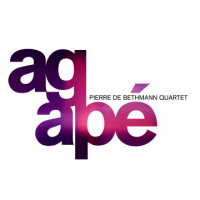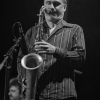Home » Jazz Articles » Album Review » Pierre de Bethmann Quartet: Agapé
Pierre de Bethmann Quartet: Agapé
De Bethmann's journey since the days of the much-remembered Prysm has been incessant and multifaceted, featuring various ensembles—some of them coexisting in parallel—of diverse formats and with quite disparate musical objectives. Through all of them, and perhaps even more so through his solo achievements, he pointed with gentle firmness in a direction that was not at all divergent but increasingly distant from the one established by those angular, rhythmically crisp beginnings. At the end of the 2000s, De Bethmann seemed eager to break through the successful glass ceiling shaped by his polyhedral background and begin freely exploring even more ambitious terrain than those he had scrutinized until then.
A dozen years later, the appearance of Go (Plus Loin Music, 2012), the first official release by the Pierre de Bethmann Quartet, marked— probably more than his previous Ilium project—a direct and frontal encounter with the sharp sonority and rhythmic drive so characteristic of his first band. David El-Malek's tenor sax, far from blurring that longed-for prismatic spirit, added a layer that confirmed the new format as perhaps the most natural evolution of the previous acoustic trio: the squaring of the triangle, so to speak. Almost twelve years after that first recording, a new version of the quartet emerged, with Simon Tailleu on double bass and Antoine Paganotti on drums, while keeping the essential El Malek voice. After some time of breaking in, the quartet holed up in February 2023 for two consecutive days at Studio Ferber in Paris, to create two future releases: Credo (ALEA, 2024), recorded on the first day and released in January 2024, and Agapé, the result of the second day's session, released in January 2025. It seems unlikely that the magnificent ideas and forms of the first would not find continuity in the second. Nevertheless, we might say a very nuanced "What a Difference a Day Makes," given that the second session picks up where Credo left off and takes us to even higher ground.
From its first composition, Agapé (an ancient Greek word for altruistic love) makes clear we are in for an intense, emotional journey. The record opens with the title track, introduced by electronic sounds from a Korg synth that creates a sci-fi atmosphere, before giving way to a Steinway that grounds us in the familiar distinctive harmonic structures of the Frenchman. Following the exposition of the main motif, De Bethmann delivers a subtle solo, carefully constructed, and hands the spotlight to El Malek— a musician deserving wider recognition outside France—who, in a passionate crescendo, rises into a tenor colossus, with well-chosen echoes of Michael Brecker. "Rien" flows seamlessly from there, carrying forward the harmonic arguments of the previous track, suggesting a suite-like feeling that, as we will see, gets confirmed at the end of the disc. De Bethmann slows here, creates spaces to relieve tension, establishes a sinuous, choppy melody and delivers an almost phlegmatic Moog solo, answered by a now shorter and more lyrical El Malek. "En Plus" breaks the established mood, with a chorus that sticks in your head. It shows the composer's most funky and playful side, as he engages in a friendly discussion with El Malek, while Paganotti's drums have the final word. In stark contrast, "Deep" restores the album's dominant atmosphere, with a mesmerizing piano evolving, almost impressionistic, over the musical borders set by the rest of the ensemble: a submerged space where the voices of Tailleu and De Bethmann stand out, delicately emerging like ghostly sonic filaments.
The two final pieces are surely this release's best and most essential part. The masterful "Grâce À Vous" maintains the dreamy vibe while slowly building tension, to gradually shape a song that seems to have no defined melodic contours: its elusive line is structured around El Malek's sensational solo discourse and the smart punctuations of the rhythmic trio, with the pianist adding subtle textures via an electric keyboard. This leads to the conclusive "Agapes" which appears as the natural continuation of the previous track: an ascending vamp, supported by the same harmonic sequence that opens the album and which, like an infinite helical staircase, is brightly climbed by a killer El Malek speech. This cadence breaks at its climax to give way to an inspired resolution, an ending as hopeful as it is perhaps illusory, with its final moments recapturing the sounds and harmonies with which this implied suite began.
De Bethmann's music creates unexpected inner pathways for the willing listener, where technique and poetry, intellect and beauty, substance and essence meet and reconcile: that difficult balance between methodological complexity and inspiring feeling which, poorly handled, can be artistically fatal. His approach stems from a broad-minded humanism that rejects dogmas and absolute truths but draws with respectful and discerning curiosity from diverse spiritual and intellectual currents. Titles and comments offer abundant clues, but it is in his brilliant compositions and compelling interpretations that all this takes on meaning and form. Agapé, a work infused with a concept that leaves no room for doubt, stands as a splendid example of his ongoing search for personal and universal harmony, and that is one more of the many well-founded reasons why it demands to be listened to with exquisite, and repeated, attention.
Track Listing
Agapé; Rien; En Plus; Deep; Grâce à Vous; Agapes.
Personnel
Album information
Title: Agapé | Year Released: 2025 | Record Label: ALÉA
Tags
PREVIOUS / NEXT
Pierre de Bethmann Concerts
Support All About Jazz
 All About Jazz has been a pillar of jazz since 1995, championing it as an art form and, more importantly, supporting the musicians who make it. Our enduring commitment has made "AAJ" one of the most culturally important websites of its kind, read by hundreds of thousands of fans, musicians and industry figures every month.
All About Jazz has been a pillar of jazz since 1995, championing it as an art form and, more importantly, supporting the musicians who make it. Our enduring commitment has made "AAJ" one of the most culturally important websites of its kind, read by hundreds of thousands of fans, musicians and industry figures every month.






















